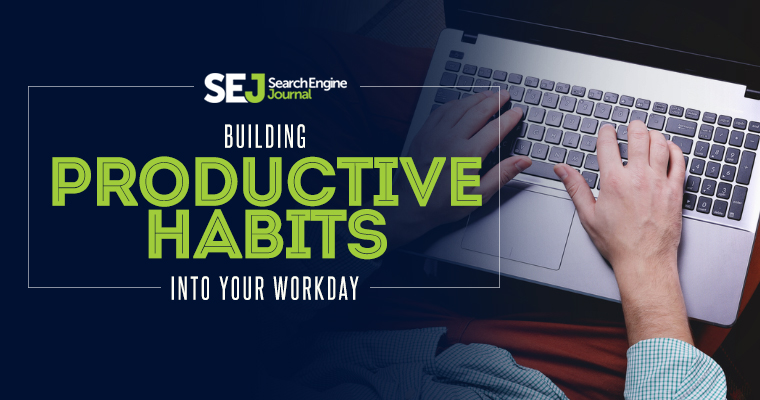Some days it just feels like you can’t get anything done.
Even if you get to the office early, skip lunch, and work late, it’s easy for entire days to get wasted fighting minor fires, sending emails, and sitting through time-wasting meetings while the important, big-picture projects get pushed back another day.
If you’ve had too many days in a row where you’ve exhausted yourself working but still have more to do, something needs to change. I’m not necessarily talking about a job change here, but knowing how to form and keep productive habits can make a huge difference in how much you get done while lowering your stress levels.
It’s pretty common to see productivity articles that claim to have the ultimate secret to being an effective worker and can help you achieve your goal of being a CEO, published novelist, and triathlete — all while getting 8 hours of sleep and staying in tip-top shape!
But no matter how good the advice or tricks are, they won’t make you more productive if you don’t repeat them day after day. The key is to understand the behavior patterns you have now and make your natural habit-forming ability work in your favor rather than against it. Here are some ways to make productive habits a part of your day, from the moment you wake up to the time you hit the sack.
Get Up Earlier & Utilize Morning Hacks

It’s not uncommon for highly successful people to also be very early risers. Margaret Thatcher, Hain Celestial Group CEO Irwin Simon, Apple CEO Tim Cook and many others are all members of the early-risers club. Many people note those extra hours in the morning allow them to get things done (exercise, emails, meditation) that they wouldn’t have the motivation for otherwise.
It’s worth noting there are studies that claim the exact opposite, saying night owls have a leg up on those who get up early. There will always be studies and evidence that contradict each other, but the decision of when to get up can be partly common sense.
If you have a job that starts somewhere between 7 and 9 a.m. like many people, getting up early allows you to get more done before work. If you wait until after work to meditate and exercise, you may not have the energy, focus or determination to still get them done.
Here are some other great things to add to your morning routine:
- Early Morning Conditioning: So how do you make a 5:30 a.m. wake-up time happen when you can barely open your eyes before 7 a.m.? Don’t try to do it all in one day. Try setting your alarm a little earlier every day. In two months, you’ll be up an entire hour earlier.
- Tackle Your Hardest Tasks First: Once you get to work, you face an important choice that can decide the entire outcome of your day. If you spend the first hour answering emails and attending to small tasks, you might throw your whole day off and never get to the most important projects. Mark Twain is famous for saying: “Eat a live frog every morning, and nothing worse will happen to you the rest of the day.” What this means is you should make a point to tackle your hardest projects first. Take this advice and start your day with a difficult, yet worthwhile project. If you absolutely must, take a few minutes to scan your email and make sure there aren’t any huge disasters or issues you have to attend to immediately. Try not to spend more than 15 minutes on this so you can start your day off right with a good chunk of productive work.
- Try Following the 80/20 Rule (Pareto Principle): This states that only 20 percent of what you do during the day produces 80 percent of your daily results. This might also be relabeled the “Work Smarter, not Harder” rule. Utilize planning on big projects to narrow down your tasks until you find that 20 percent that yields you the most results. Try eliminating things in your workday that don’t matter.
- One Task at a Time: For roughly an hour, do one task and one task only. Don’t task switch, as this can be even worse for your productivity. Don’t check social profiles or email. Don’t stop to instant message co-workers. Just work. If your workplace allows it, you should schedule the time on your calendar so that co-workers know not to set meetings with you during that stretch of time.
Scheduling may be one of the most important parts of sticking to this new productive habit. According to Charles Duhigg in The Power of Habit, habits are made up of three elements: the cue (the reason you take an action), the routine (the action), and the reward (the event that occurs after the action). Maybe the habit you’ve formed is to first thing tackle small tasks that may give you a sense of accomplishment but stop you from working on big-picture projects. Realizing the trigger is the first step to changing the behavior that follows.
Fight Off the Afternoon Slump

Here’s an interesting (yet gross) fact for you. Did you know that keyboards, tablets and smartphones contain more germs than public toilet seats? Here’s the info from Which?, a self-defined “consumer champion.” Yes, it’s disgusting and yes, it’s true. First off, we should all probably clean our keyboards more. But also, we should probably stop eating at our desks because of how much this can contribute to the germs. If that doesn’t give you enough reason to leave your desk for lunch, you should also know that taking a mid-day break can make you more productive.
First off, we should all probably clean our keyboards more. But also, we should probably stop eating at our desks because of how much this contributes to the germs. If that doesn’t give you enough reason to leave your desk for lunch, you should also know that taking a mid-day break can make you more productive.
If that doesn’t give you enough reason to leave your desk for lunch, you should also know taking a mid-day break can make you more productive.
Make the Most of Your Breaks
A study conducted by researchers at Stanford University in 2014 found that walking can make you about 60 percent more creative. When you get back from your lunch, you may notice that you feel more focused. This is because exercise reduces stress in a number of interesting ways, as covered here by the Huffington Post. This feeling of clarity you get after exercise may even become the reward that solidifies this new, healthy habit.
If you want to add another dimension to the reward you get from starting a habit like this, you might try using an app like Charity Miles that has sponsors that will donate to a charity of your choice for every mile you walk, bike, or run. Adding an emotional/spiritual dimension can be an excellent way to motivate yourself to do something you wouldn’t normally do.
Take More Breaks Throughout the Day
There are various schools of thought when it comes to how long you should work before taking a break. The Daily Muse recommends 52 minutes of work followed by a 17-minute break. This is a good place to start.
For the rest of the afternoon, try to stick to the 52 minutes on, 17 minutes off schedule that you established in the morning. Track your productivity and note any uptick in how much you get done.
What You Do at Night Can Decide Your Day Tomorrow
Hyundai put out an ad that rings true for many Americans. In it, a young man in an office is shown finishing work, gathering his things and strolling confidently past his gawking co-workers who are in shock, not just because he’s leaving, but because he’s leaving at 6:01 p.m. sharp. The ad is a little over-the-top, but feeling judged for not working late is a common feeling for some workers.
But should you feel that way? Not necessarily. Americans work a lot, which only contributes to our stress in the long-term. The Bureau of Labor Statistics reported some 11 million Americans work over 59 hours a week. Even if you only sign off for a few hours to eat dinner and spend time with loved ones, taking time away from work will make you more ready to get back at it again and work even harder.
Get More Sleep
We already covered how getting up early can help you get more done while everyone else is still snoozing. The flip side is you need to go to bed early, too. While some people claim to be able to perform just fine on 4-6 hours of sleep, most of us need somewhere around 7 to 8 hours of shuteye each night.
If you skimp on this necessity, you’ll be less ready to get up at your new early rising time, and your productivity will suffer for the rest of the day. If you have to pull an all-nighter, here’s a guide from New York Magazine on how to make it through the occasional sleep-deprived day.
Make Realistic Goals & Customize Around YOU
Forming healthy, productive workday habits is about maintaining structure in your day and creating new reactions to the many triggers. If you can figure out where your day gets derailed, it becomes easier to replace a learned action with a new one that helps you get more done in less time. Eventually, the increase in your output will become the reward that helps you stick to the new habits you’ve created.
What are some of the things you do to stay productive at work? Please share!
Image Credits
Featured Image: Image by Paulo Bobita
In-post Photo #1: lighwavemedia/Shutterstock.com
In-post Photo #2: Monkey Business Images/Shutterstock.com





![AI Overviews: We Reverse-Engineered Them So You Don't Have To [+ What You Need To Do Next]](https://www.searchenginejournal.com/wp-content/uploads/2025/04/sidebar1x-455.png)